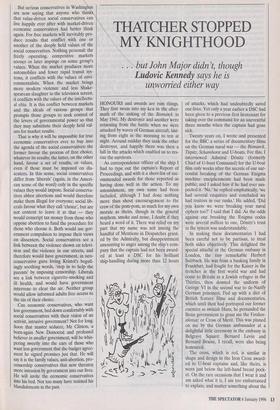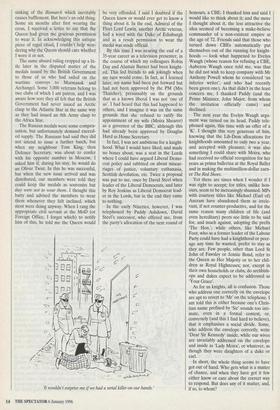THATCHER STOPPED MY KNIGHTHOOD
ut John Major didn't, though I, ► dovic Kennedy says he is
Unworried either way
HONOURS and awards are rt6 things. They first swam into my ken in th after- math of the sinking of the Bisma k in May 1941. My destroyer and another ere returning from the battle when we re attacked by waves of German aircraft, last- ing from eight in the morning to ten at night. Around midday they sank the other destroyer, and happily there was then a lull in the attacks which enabled us to res- cue the survivors.
As correspondence officer of the ship I had to type out the captain's Report of Proceedings, and with it a short-list of rec- ommended awards for those reported as having done well in the action. To my astonishment, my own name had been included, although I had done nothing more than shout encouragement to the crew of the pom-pom, as much for my own morale as theirs, though in the general mayhem, smoke and noise, I doubt if they heard a word of it. There was relief on my part that my name was not among the handful of Mentions in Despatches grant- ed by the Admiralty, but disappointment amounting to anger among the ship's com- pany that the captain had not been award- ed at least a DSC for his brilliant ship-handling during more than 12 hours of attacks, which had undoubtedly saved our lives. Yet only a year earlier a DSC had been given to a previous first lieutenant for taking over the command for an uneventful three months when the captain had gone sick.
Twenty years on, I wrote and presented for the BBC a series of documentary films on the German naval war — the Bismarck, Tirpitz, Scharnhorst and U-boats. For this, I interviewed Admiral DOnitz (formerly Chief of U-boat Command) for the U-boat film only weeks after the secrets of our suc- cessful breaking of the German Enigma machine encipherments had been made public; and I asked him if he had ever sus- pected it. 'No,' he replied emphatically, 'we had several enquiries and concluded we had traitors in our ranks.' He added, 'Did you know we were breaking your naval ciphers too?' I said that I did. As the odds against our breaking the Enigma codes were several million to one, Denitz's trust in the system was understandable.
In making these documentaries I had been careful not to be partisan, to treat both sides objectively. This delighted the special attache at the German embassy in London, the tiny remarkable Herbert Sulzbach. He was from a banking family in Frankfurt, had fought for the Kaiser in the trenches in the first world war and had come to Britain as a Jewish refugee in the Thirties, then donned the uniform of George VI in the second war to de-Nazify German prisoners. Fed up with a diet of British feature films and documentaries, which until then had portrayed our former enemies as swinish Huns, he persuaded the Bonn government to grant me the Verdien- stkreutz or Cross of Merit. This was pinned on me by the German ambassador at a delightful little ceremony in the embassy in Belgrave Square: Bernard Levin and Bernard Braine, I recall, were also being honoured.
The cross, which is red, is similar in shape and design to the Iron Cross award- ed to U-boat captains and, like theirs, is worn just below the left-hand breast pock- et. On the rare occasions that I wear it and am asked what it is, I am too embarrassed to explain, and mutter something about the sinking of the Bismarck which inevitably causes bafflement. But here's an odd thing. Some six months after first wearing the cross, I received a letter to say that the Queen had given me gracious permission to wear it. In acknowledging this antique piece of regal ritual, I couldn't help won- dering why the Queen should care whether I wore it or not.
The same absurd ruling cropped up a lit- tle later in the disputed matter of the medals issued by the British Government to those of us who had sailed on the wartime convoys to Murmansk and Archangel. Some 3,000 veterans belong to two clubs of which I am patron, and I was aware how sore they all felt that the British Government had never issued an Arctic clasp to the Atlantic Star in the same way as they had issued an 8th Army clasp to the Africa Star.
The Russian medals were some compen- sation, but unfortunately demand exceed- ed supply. The Russians had said they did not intend to issue a further batch, but when my neighbour Tom King, then Defence Secretary, was about to confer with his opposite number in Moscow, I asked him if, during his stay, he would do an Oliver Twist. In this he was successful, but when the new issue arrived and was distributed, our members were told they could keep the medals as souvenirs but they were not to wear them. I thought this batty and advised the members to wear them whenever they felt inclined, which most were doing anyway. When I rang the appropriate civil servant at the MoD (or Foreign Office, I forget which) to notify him of this, he told me the Queen would be very offended. I said I doubted if the Queen knew or would ever get to know a thing about it. In the end, Admiral of the Fleet Lord Lewin, another Arctic veteran, had a word with the Duke of Edinburgh and as a result permission to wear the medal was made official.
By this time I was nearing the end of a 35-year career as a television presenter, in the course of which my colleagues Robin Day and Alastair Burnet had been knight- ed. This led friends to ask jokingly when my turn would come. In fact, as I learned later, my name had been put forward but had not been approved by the PM (Mrs Thatcher), presumably on the grounds that as a known liberal I was not 'one of us'. I had heard that this had happened to others, and I imagine it was on the same grounds that she refused to ratify the appointment of my wife (Moira Shearer) as a governor of the BBC, although this had already been approved by Douglas Hurd as Home Secretary.
In fact, I was not ambitious for a knight- hood. What I would have liked, and made no bones about, was a seat in the Lords where I could have argued Liberal Demo- crat policy and rabbited on about miscar- riages of justice, voluntary euthanasia, Scottish devolution, etc. Twice a proposal was put to me, once by David Steel when leader of the Liberal Democrats, and later by Roy Jenkins as Liberal Democrat lead- er in the Lords, but in the end they came to nothing.
In the early Nineties, however, I was telephoned by Paddy Ashdown, David Steel's successor, who offered me, from the party's allocation of the next round of It wouldn't surprise me if we had a serial killer on our hands.' honours, a CBE. I thanked him and said I would like to think about it; and the more I thought about it, the less attractive the idea seemed of becoming a make-believe commander of a non-existent empire at the age of 72. Friends said that those who turned down CBEs automatically put themselves out of the running for knight- hoods — look what happened to Evelyn Waugh (whose reason for refusing a CBE, Auberon Waugh once told me, was that he did not wish to keep company with Mr Anthony Powell whom he considered 'an inferior writer', and who had recently been given one). As that didn't in the least concern me, I thanked Paddy (and the Prime Minister, John Major, from whom the invitation officially came) and declined.
The next year the Evelyn Waugh argu- ment was turned on its head. Paddy tele- phoned again, this time with an offer of a `K'. I thought this very generous of him, knowing that the Lib-Dem allocations for knighthoods amounted to only two a year, and accepted with pleasure; it was also something I could share with Moira, who had received no official recognition for her years as prima ballerina at the Royal Ballet and in making the multimillion-dollar earn- er The Red Shoes.
Yet there are times when I wonder if I was right to accept; for titles, unlike hon- ours, seem to be increasingly shunned. MPs with courtesy titles like Michael (Earl of) Ancram have abandoned them as irrele- vant, if not counter-productive, and for the same reason many children of life (and even hereditary) peers see little to be said for, and much against, adopting the prefix `The Hon.'; while others, like Michael Foot, who as a former leader of the Labour Party could have had a knighthood or peer- age any time he wanted, prefer to stay as they are. Few people, other than Lord St John of Fawsley or Jennie Bond, refer to the Queen as Her Majesty or to her chil- dren as Royal Highnesses; nor, except in their own households or clubs, do archbish- ops and dukes expect to be addressed as `Your Grace'.
As for us knights, all is confusion. Those who address one correctly on the envelope are apt to revert to 'Mr' on the telephone. I am told this is either because one's Chris- tian name prefixed by 'Sir' sounds too inti- mate, even in a formal context, or, conversely (and this I find hard to believe), that it emphasises a social divide. Some, who address the envelope correctly, write `Dear Sir Kennedy' inside, while our wives are invariably addressed on the envelope and inside as 'Lady Moira', or whatever, as though they were daughters of a duke or earl.
In short, the whole thing seems to have got out of hand. Who gets what is a matter of chance, and when they have got it few either know or care about the correct way to respond. But does any of it matter, and, if so, to whom?



















































 Previous page
Previous page